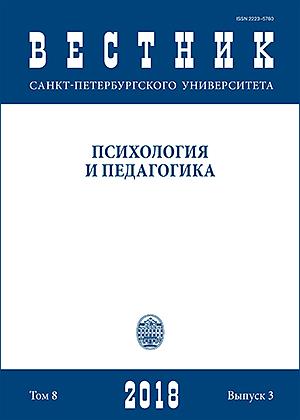Связь теории сознания и регуляторных функций в старшем дошкольном возрасте
DOI:
https://doi.org/10.21638/11701/spbu16.2018.306Аннотация
Исследование посвящено изучению связи регуляторных функций и когнитивной способности, которая в зарубежных исследованиях называется “theory of mind” («теория сознания»), в старшем дошкольном возрасте. Несмотря на активное изучение данной области в зарубежной психологии, подобных экспериментальных исследований в России пока проводится сравнительно мало и совсем немногие из них посвящены дошкольному возрасту. Можно предположить, что такая ситуация связана в том числе с отсутствием разработанного диагностического инструментария, направленного на изучение теории сознания. Поэтому целью нашего исследования было изучение связи теории сознания с развитием регуляторных функций с помощью адаптированных нами зарубежных методов диагностики данных способностей. В исследовании приняли участие 267 детей в возрасте 5–6 лет (143 мальчика и 124 девочки), воспитанники старших групп детских садов Москвы. Анализ полученных результатов показал наличие значимых связей между всеми тремя компонентами регуляторных функций (рабочей памятью, когнитивной гибкостью и сдерживающим контролем) и успешностью выполнения заданий на теорию сознания. Также были выделены три типа развития регуляторных функций у детей дошкольного возраста и выявлены различия в успешности выполнения отдельных заданий на теорию сознания у детей, относящихся к разным типам. Результаты корреляционного и кластерного анализа свидетельствуют о связи уровня понимания ребенком ложных убеждений и таких компонентов когнитивного контроля, как торможение и переключение. Таким образом, проведенное исследование показывает связь теории сознания и когнитивной регуляции в старшем дошкольном возрасте. Дальнейшее изучение данных когнитивных способностей дошкольников поможет лучше понять и изучить логику развития таких значимых социальных навыков, как эмоциональная регуляция, выстраивание позитивных отношений со сверстниками и успешное поведение в классе.
Ключевые слова:
дошкольный возраст, произвольность, регуляторные функции, интеллект, теория сознания
Скачивания
Библиографические ссылки
Загрузки
Опубликован
Как цитировать
Выпуск
Раздел
Лицензия
Статьи журнала «Вестник Санкт-Петербургского университета. Психология» находятся в открытом доступе и распространяются в соответствии с условиями Лицензионного Договора с Санкт-Петербургским государственным университетом, который бесплатно предоставляет авторам неограниченное распространение и самостоятельное архивирование.




